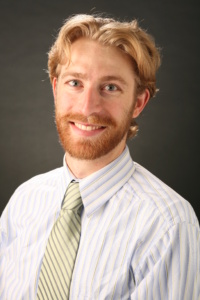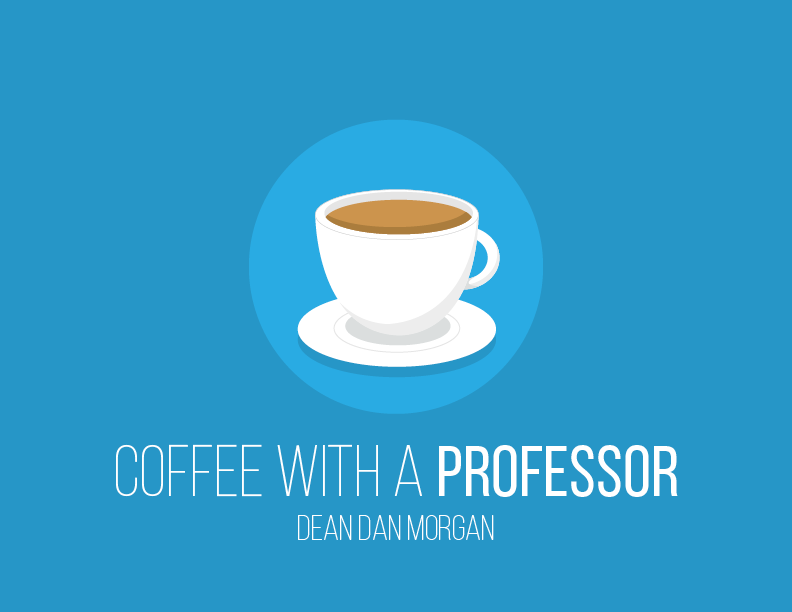Dean Dan Morgan is an associate dean in the College of Arts and Sciences, principal senior lecturer of the Earth and Environmental Sciences department, faculty head of Memorial House on the Martha River Ingrams Commons and a faculty VUceptor. In Coffee with a Professor, the Hustler interviewed Dean Morgan about dinosaurs, saving the planet and Chinatown.
Dean Morgan’s Favorites
 Favorite…
Favorite…
Coffee order: Hot lattes
Restaurant: Husk
Movie: Chinatown
Geologic time period: Last ice age
Geologic formation: Beacon Sandstone
Favorite mineral: Beryl or malachite
Favorite rock: Hope Granite
Organism: Triceratops
Vanderbilt Hustler: You talked a lot about how you viewed the world through the lens of geology and earth and environmental sciences. What is it that fascinates you so much about that?
Dean Morgan: It’s a combination of a couple different things. Some of it is really interesting science questions to work on and get to pull together. It’s a very interdisciplinary science, which I like because ultimately I like physics, but I wasn’t a pure physics person. I liked chemistry, but I wasn’t going to dive that deep into it. I really liked math, and I double majored in math and geology. I also knew that, “All right, I’m not as good at math as some of these other people in my classes, but I like doing it.” Geology is a really neat thing where you don’t have to be great, but you have to be good at all of those things and then combine them and use them towards earth applications.
The other aspect of that is I like the kind of stories that you tell as a geologist. In picking your major, they always tell you to find your passions, right? In some ways, that is finding the stories that resonate with you. Every major, every discipline, you’re going to write papers, you’re going to do labs. You’re ultimately telling a story. There’s always been something that resonated with me with that aspect of natural history, telling stories of the earth and thinking about things over long timescales and not just thinking about, “Why is this tree growing here?” but, “Why has there been a forest here for tens of thousands of years?” I’ve always liked that big picture kind of stuff. Big picture wise, I’m just trying to save the planet. Nothing short of that will satisfy me.
VH: What do you think is the biggest human-made threat to our planet right now?
DM: I will fully admit that that is a hard question for me to answer. I think one of the central challenges is climate change. It’s also really hard to say, “We need to deal with climate change,” when there are, what, a billion people without access to clean water today? I agree that hopefully we can do those things hand in hand. But it is hard to prioritize those things, so I want to come back to the movie Chinatown. One of the ideas in it is that the detective just doesn’t know whether he’s helping or hurting. I feel that way with environmental issues. How do I know that I’m doing good? Am I actually helping something versus making more harm, and am I doing enough good?
I’ll give you a single example from my recent life. We have two boys; they’re four and six now. When they were little, they were wearing diapers all the time. You’re like, “I can have these disposable diapers, or I can have cloth ones that I can wash and reuse.” You have to figure out, “How do I pick between what’s the impact of landfills and the environmental impact of making all those disposable diapers versus the environmental impact of using all that water and detergent to wash and clean the cloth diapers?”
What is the cost and benefit analysis to compare those things? We don’t actually have the best economic tools to do that right now. But in economic terms, there would be all these things called externalities, these things that we just don’t actually include in figuring out the cost of making a new disposable diaper. Even the social cost of people working in factories to make them. Are they paid a living wage or not? It’s not purely a natural resource question either, right?
VH: Yeah, it’s kind of a philosophical question as well.
DM: It is. And we don’t have the best tools to calculate that right now. You’ll hear a lot of about the triple bottom line, meaning when we do a cost-benefit analysis, we should look at three separate things, which would be the economic impact, environmental impact, and then the social or human impact. If you could figure out ways to have net benefits in all three of those things, that would be great. It’s not always possible.
VH: What advice do you have for Vanderbilt students who are also trying to find what they want to do in life?
DM: I think about that a lot. The short answer is that there is not one piece of advice. My standard thing is to try lots of different things. I do think you need to be willing to take some risks outside of your comfort zone and try things you’ve never heard of, or try things you know you’re not good at. I always encourage the STEM majors who say that you hate writing—it’s probably why you should go take a writing class. It’s good to think differently and stretch your brain that way. It’s also about figuring out what it is you want to go deep in.
I always like to show people this. This is my phone background here, which is a picture of me and my wife when we were nineteen years old in Joshua Tree National Park. It’s actually a camping trip for my first environmental science class I took. That’s probably February 1999. I liked the fact that we got to go camping and that fieldwork was a part of your job. I didn’t grow up doing a ton of that. My sophomore year, I took another geology class that was a hydrogeology class. It was basically a differential equations course, but taught as a geology perspective. I really liked the idea that I could use very quantitative, very mathematical terms to describe science problems. Things just sort of clicked for me in separate ways. It wasn’t a single moment, but it just sort of slowly built and it was really, “Oh this is all coming together.”
VH: What’s the most shocking thing that you’ve found in your research?
DM: I’ll tell you, I don’t find a lot of shocking and amazing things. One of the fun things about Antarctica, and one of the reasons we go there a lot, is that it has a really long record of glacial change. Here in North America, we’ve had glaciers come and ago. But we see almost none of that because it rains on them, and gophers and ants and people move dirt around. It just gets slowly moved and eroded away. But in Antarctica, it’s so cold and dry that we get glacial deposits that have been sitting on the surface for two million years, three million years. That just wouldn’t happen almost anywhere else in the world. It might not be shocking, but it’s really kind of amazing because this little 30-foot hill has been sitting here for maybe five or six million years.
Responses have been edited for length and clarity.











